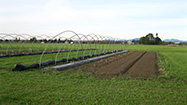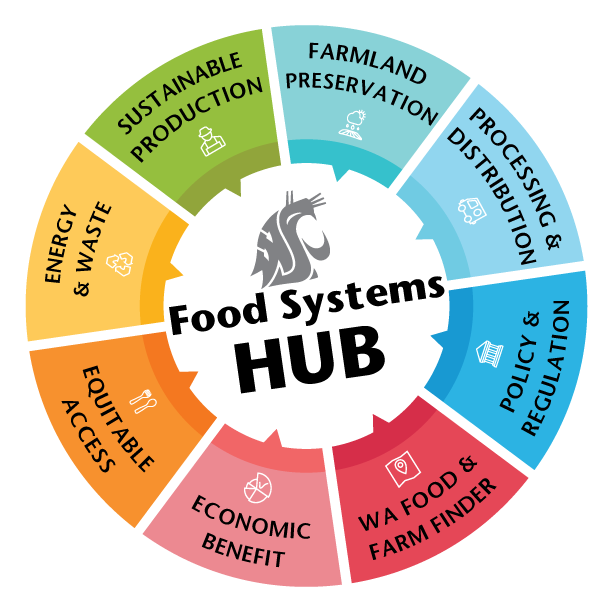
Food security and food sovereignty are increasingly important; especially now, as more people begin to rely more heavily on our local resources, including our food pantries. As part of our essential critical infrastructure, these folks have seen a major increase in use by local residents who are now suddenly without access or are very limited in their ability to get food for themselves and their families.
WSU Extension is bringing attention to the importance and use of season extension facilities for our local growers to produce more food in order to meet this increased need in our communities. During the pandemic, faculty studied the impact of shelter in place orders alongside the knowledge, motivation, and organizational influences driving frontline employees to work during the pandemic (Read More).

Hoop Houses
Hoop Houses are small, semi-portable structures that can be used as a small greenhouse structure for starting seedlings and for growing heat-loving vegetables. A hoop house provides frost protection, limited insect protection, and season extension. Hoop house structures are easily constructed and will last many years. Hoop house dimensions can be adjusted to personal needs, but a structure 4 feet x 10 feet is recommended. These dimensions allow easy side access for weeding and allow adequate hoop arch strength relative to span. Cost of this structure is modest. A 4 foot x 10 foot Hoophouse with soil fill can be constructed for approximately $150-$200.
Resources:
ATTRA Hoophouse Webinar. A slide presentation that presents the uses and benefits of hoop houses, different types of hoop houses, construction, materials and cost estimates, management of crops, soil fertility, pests and weeds, and the economics and marketing of crops.
Building a Hoophouse (Part 1) and Building a Hoophouse (Part 2). Michigan State University’s Hoophouse expert, Adam Montri, narrates this two-part instructional video on hoophouse construction.
Field Hoophouse. An easy-to-make field hoophouse. New Mexico State University Circular 606.
High Tunnel Overview. Benefits and costs of high tunnels. Links to research studies regarding crop production. The Pennsylvania State University.

High Tunnel Production and Low Cost Tunnel Construction Webinar from eOrganic. A Webinar presented by Tim Coolong, University of Kentucky, is an introduction to season extension using high tunnels. Covers common issues associated with tunnel production, and provides a short overview of how to construct a low cost pvc tunnel. The Webinar is for growers who are interested in season extension, but who may not want to invest a large amount of money right away.
High Tunnel Construction. Site selection and a slide show of high tunnel construction. Rutgers University.
High Tunnel Guide. Brief overview of advantages, disadvantages, structure selection, installation and management of high tunnels. USDA NRCS.
High Tunnel Manual. Construction and management information, case studies of farms in US using high tunnels with different crops and management intensity. Cornell University, University of Vermont, NESARE.
How to Build a Low-Cost Hoop House. Kerr Center for Sustainable Agriculture. Below is a “how to video” (*not science based).
Manufacturers and Suppliers. List of common manufacturers and suppliers of high tunnels in the U.S.
Portable Field Hoophouse. A simple, inexpensive design for a portable field hoophouse. Washington State University Extension Bulletin EM015.
The Hoophouse Handbook. Provides grower-based experiences using hoophouses and high tunnels for vegetable and flower production. Includes design ideas, budget sheets and much more. Growing for Market.
Resources and News for Farmers
WSU Food Systems (statewide farm and ranch connectivity)
What is the WSU Food Systems HUB?

The HUB was created in 2020 as a networking and resource-sharing space.
The event gathers leaders from across the Washington State food system and draws from our 7 focus areas: Sustainable Production Systems, Equitable Access, Energy and Waste Reduction, Harvesting, Processing and Distribution, Economic Benefits, Policy and Regulation, and Land and Resource Stewardship, in addition to the WA Food and Farm Finder. You can view all the previous HUB episodes on our YouTube Channel.
Who is the WSU Food Systems HUB for?
Leaders from across the Washington State food system, from farmers and educators to advocates and resource providers:
- Community-Based Orgs
- State Agency Staff and Specialists
- WSU Food Systems Team Members
- Farm and Food Businesses
- WSU Extension, Research, & Academic Faculty and Staff
For more resources and information, click here.
Questions regarding food storage, food safety or food preservation?
The Master Food Preserver volunteers from Benton-Franklin Counties are reaching out statewide to support consumers with food handling in their homes.
